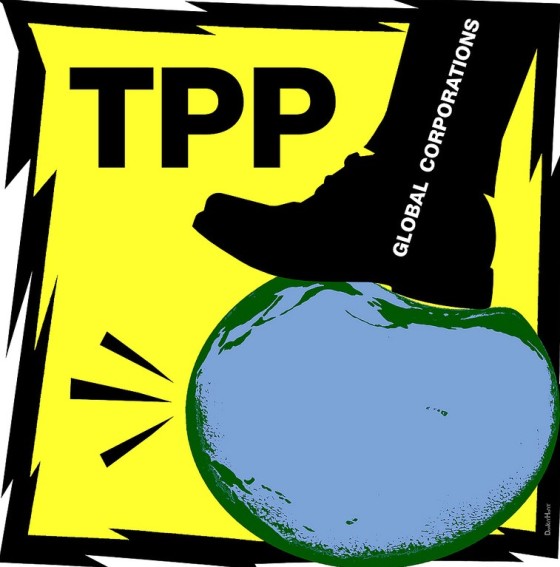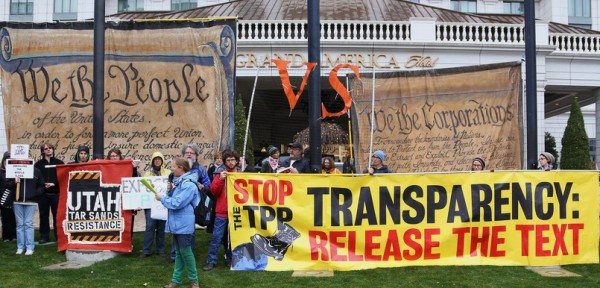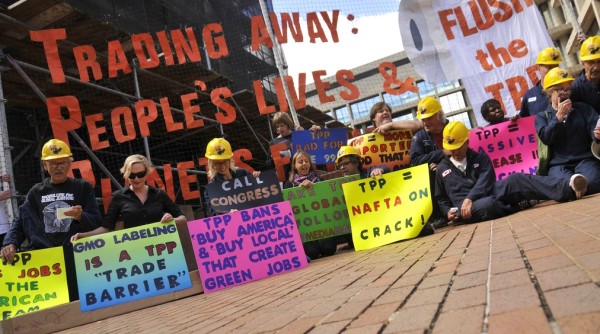TPP: Corporate Greed Would Win, the Environment Would Lose
The environment chapter of the secretly negotiated Trans-Pacific Partnership (TPP) agreement is evidently meant to be the sweetener for a broader set of more restrictive arrangements, but it falls far short of its protective purpose.
The full draft of the chapter, released by WikiLeaks on Wednesday January 15, 2014 and dating from November 24, 2013, reveals a series of measures that constitute, in Julian Assange’s words, a “public sweetener” that is merely “a toothless public-relations exercise with no enforcement mechanism.” In other words, the documents show a dilution of commitments: a lowering threshold in terms of insuring international standards for environmental protection. Trade comes first, the environment, a lamentable second.
While the United States barnstorms its way through other sections of the TPP – notably in matters concerning copyright infringement and intellectual property – it is taking a softer approach towards the environment. Notions of give and take here mean giving up the ghost on solid environmental protections, notably when it comes to the “shift” to the Asia Pacific. For example, there are no legally binding pollution-control requirements. There are no bans on the harvest of some animal species: for instance, shark fins. And the approaches to the restriction of logging are skimpy.
Furthermore, the Chairs’ Report of the Environment Working Group outlines areas of vast disagreement:
“Nevertheless, while the Chair sought to accommodate all the concerns and red lines that were identified by the Parties regarding the issues in the text, many of the red lines for some Parties were in direct opposition to the red lines expressed by other Parties.” Such clashes “prevented the Environment Working Group from reaching agreement on all aspects of the Chapter.”
Disagreements were strongly evident over the approaches for addressing multilateral environmental agreements. Definitions over such matters as statute or regulation were also challenged. Nor could the US agree to Article 13 covering Trade and Biodiversity as the country “is not a party to the Convention on Biological Diversity.” Other states, including Vietnam, Peru and Malaysia, refused to accept references to fossil-fuel subsidies under Article 15 covering trade and climate change. Restrictions on fisheries were also contested.
All of this stands to reason. The environmental-protections chapter remains one of the most contentious areas for the negotiating parties. The talks have already dragged on for three years, and hopes to finalize matters by the end of 2013 did not eventuate.
If there is an identifiable tone to the section, it is that of watering down environmental protections. As reported in the New York Times (Jan 15), “The Obama administration is retreating from previous demands of strong international environmental protections in order to reach agreement on a sweeping Pacific trade deal that is a pillar of President Obama’s strategic shift to Asia.”
A survey of a few sections of the consolidated text serves to prove the point. Article 3 speaks of “general commitments” to recognize “the importance of mutually supportive trade and environmental policies and practices to improve environmental protection in the furtherance of sustainable development.” Crucially, paragraph 2 of the same section acknowledges “the sovereign right of each Party to establish its own levels of domestic environmental protection and its own environmental priorities, and to set, adopt or modify accordingly its environmental laws and policies.”
While the intellectual-property chapter of the TPP tends to trample over sovereignty with clumsy disdain, the environmental-protection chapter tends to embrace individual interpretations about how best to protect and enforce matters concerned with protection of the environment.
Article 8, on Corporate Social Responsibility, advocates that parties to the agreement “encourage enterprises operating within its territory or jurisdiction, to adopt voluntarily, into their policies and practices, principles of corporate social responsibility related to the environment, consistent with internationally recognized standards and guidelines that have been endorsed or are supported by that Party.” An atmosphere of voluntary compliance prevails, suggesting that polluting entities may hope, at worst, to receive a slap on the wrist.
According to Article 5, which provides for procedural matters relevant to the agreement, mechanisms are to be put in place to allow “interested parties” to make complaints about environmental violations. Judicial, quasi-judicial or administrative proceedings for the enforcement of such environmental laws are also to be put in place. As with other international agreements, the parties, at their own discretion, get to decide how best to enforce the protocol. Yes, the section suggests that appropriate sanctions and remedies will be leveled where appropriate, but this is a matter of individual choice.
Those who praise a TPP arrangement that involves a strong environmental component have been many. Economic development can and has taken place at the expense of environment. Given that the TPP potentially covers 40 percent of the world’s gross domestic product (GDP), impacts are bound to be felt given how the agreement is enforced. Different standards across states compound the problem. It is considered vital to strike that most delicate of balances: the impetus to make economic gains while still managing the environment.
Joshua Meltzer, a Fellow in Global Economy and Development at Brookings, makes this point, though he skirts through glaring problems associated with the approaches to the TPP negotiations. The TPP “presents an important opportunity to address a range of environmental issues, from illegal logging to climate change and to create rules that strike an appropriate balance between supporting open trade and ensuring governments can respond to pressing environmental issues.”
Trade agreements could become the conduit by which environmental standards can be met. They could “strengthen the capacity for governments to respond to environmental concerns.” Meltzer is being overly optimistic, assuming a pie-in-the-sky version of economic realities. Unless the environment can itself become an economic feature of the open trade dogma, it is unlikely to have any traction in trade agreements between states of unequal economic strength.
In any case, the vital feature of such arrangements is enforcement. This is conspicuously absent from the draft. By whatever standard you choose to adopt on this, the TPP’s environmental chapter is shoddy. Its message: show us the money and financial gains; leave aside obligatory standards on matters green.
Editor’s Note: Photographs one and eleven by Paolo Marconi. Photographs two and ten by Donkey Hotey. Photographs three to nine by Backbone Campaign.
Related Articles
























You must be logged in to post a comment Login